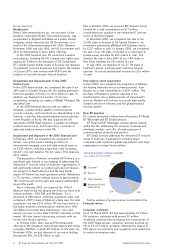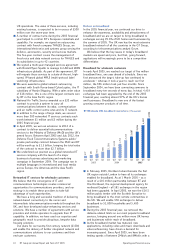BT 2005 Annual Report Download - page 19
Download and view the complete annual report
Please find page 19 of the 2005 BT annual report below. You can navigate through the pages in the report by either clicking on the pages listed below, or by using the keyword search tool below to find specific information within the annual report.
national courts. A company may also be ordered to cease
an infringing activity. There is an independent mechanism
for appeals to the Competition Appeal Tribunal against
decisions taken by Ofcom or the OFT and to the European
Court of First Instance against EC decisions.
In July 2005, the Tribunal is due to hear Wanadoo’s
appeal against Ofcom’s November 2003 finding that BT
had not infringed the prohibition on abuse of a dominant
position in relation to the pricing of BT Openworld’s
consumer broadband products. Separately, in August
2004, Ofcom claimed that BT had abused a dominant
position in relation to its pricing of consumer broadband
products. BT has responded, arguing that its pricing does
not amount to an abuse of dominance. Ofcom has
indicated that it will issue either a new statement of
objections or a decision of non-infringement in relation to
this case, in June 2005.
Enterprise Act
The Enterprise Act 2002 aims to give more independence
to the competition authorities, to reform insolvency and
bankruptcy laws and to tackle trading practices that harm
consumers.
The key provisions of the Enterprise Act, including the
new cartel offence and the section on director
disqualification, entered into force on 20 June 2003. It is
now a criminal offence, punishable by imprisonment or a
fine, or both, to engage in cartel activity. In addition,
where companies infringe UK or EU competition law,
company directors can be disqualified from being
concerned in the management of a company for a
maximum period of 15 years. The Enterprise Act also
gives the OFT power to make a market investigation
reference to the UK’s Competition Commission where the
OFT has reasonable grounds for suspecting that any
feature of a market prevents, restricts or distorts
competition in the supply or acquisition of goods or
services in the UK. Once the OFT exercises its power to
make such a reference, the Competition Commission is
required to decide whether any feature of the market
prevents, restricts or distorts competition (‘adverse
effect’) and, if so, to take action to remedy the adverse
effects. Market investigations are intended to address
competition issues in markets as a whole and not merely
the behaviour of individual players. In relation to
electronic communications markets, Ofcom has
concurrent powers with the OFT to make a market
investigation reference.
Pricing regulation
Fixed network
We are subject to price controls on our fixed network
services in the UK at two levels: retail and network. Fixed
network competitors are generally not subject to direct
price controls, although there are some controls on
mobile network operators.
Retail price controls
We are subject to two sets of UK retail price controls, one on
certain public-switched telephony call charges and
exchange line rentals, and one on certain private circuits.
Each price control is based on a formula calculated by
reference to the UK Retail Prices Index (RPI) and a factor, X.
For services covered by the controls, the weighted
average of base prices cannot increase in each year
beginning 1 August by more than the annual change in
RPI minus X. The current retail price control for public-
switched telephony, applying from August 2002 to July
2006, is RPI minus RPI (ie the value of X is RPI and prices
cannot increase). It is measured on services used by the
lowest 80% of our residential customers classified by bill
size. From August 2002, the services covered by the
control were extended to include BT’s share of the
revenue for calls to all four mobile networks, replacing the
previous separate control on BT for calls to Vodafone and
O2. The price control formula and our performance
against the formula are set out in the table below.
Under the price controls for private circuits that
applied from August 1997 to July 2001, prices for
domestic analogue and low-speed digital private circuits
could not increase by more than the change in the RPI in
any year. For all retail analogue private circuits and
8Mbit/s digital private circuits, BT has also given an
assurance to adhere to a RPI+0% price cap from 30 June
2003 until 30 June 2006.
As part of the review of price controls in 2002, BT was
required to provide a cost-based wholesale line rental
product to other service providers at a regulated price and
in a way that does not unduly discriminate between BT’s
retail business and service providers. This product,
Wholesale Access, has been available from BT since
1 September 2002. Further consultation by Ofcom
resulted in an enhanced wholesale access product being
available from 29 March 2004. When Ofcom notifies BT
that it is satisfied in relation to the introduction and
provision of Wholesale Access, it may direct that the retail
price control be adjusted to RPI+0%.
Price Control (RPI-X) Years commencing 1 August
2000 2001 2002 2003 2004
% RPI movement for the
relevant period
a
3.32 1.93 1.03 2.89 3.03
Xonprice control formula
a,b
4.50 4.50 1.03 2.89 3.03
% required change in base prices
c,d
(1.09) (2.45) 0 0 0
% change in base prices overall (1.20) (2.50) (0.22) (0.19) 0.46
e
a
Annual increase in RPI to previous June
b
From 1 August 1997, the RPI formula covers the main switched telephone services provided to the lowest 80% of BT’s residential customers by bill size
c
After permitted carry forward of any unused allowance or shortfall from previous years
d
From 1 August 2002, the RPI formula covers the change in average prices (including residential discount packages)
e
Full year forecast based on price changes implemented up to January 2005 for residential customers. There is an unused allowance of 0.41% carried
forward from the previous year which would allow prices to rise by this amount in 2005. Further price changes during this year could eliminate the
current variance but if not, the amount may be carried forward.
18 BT Group plc Annual Report and Form 20-F 2005 Operating and financial review
























